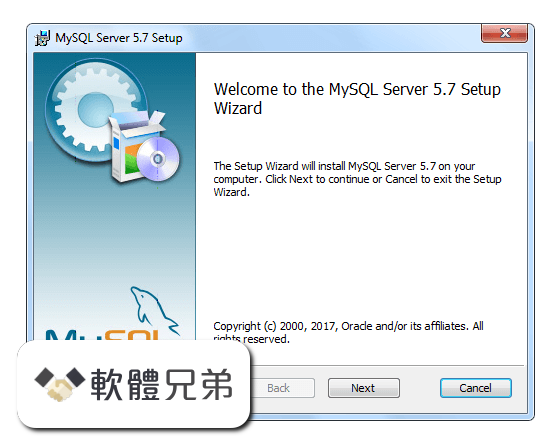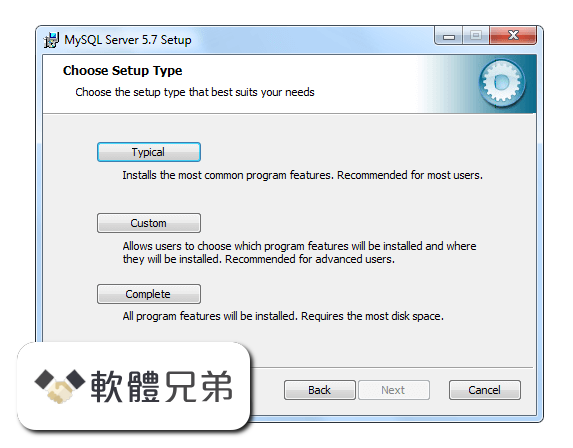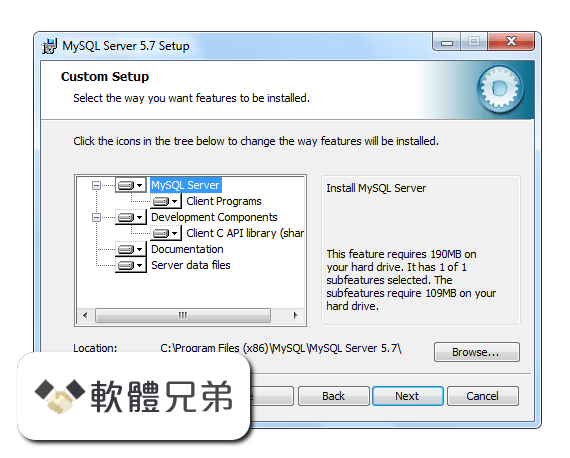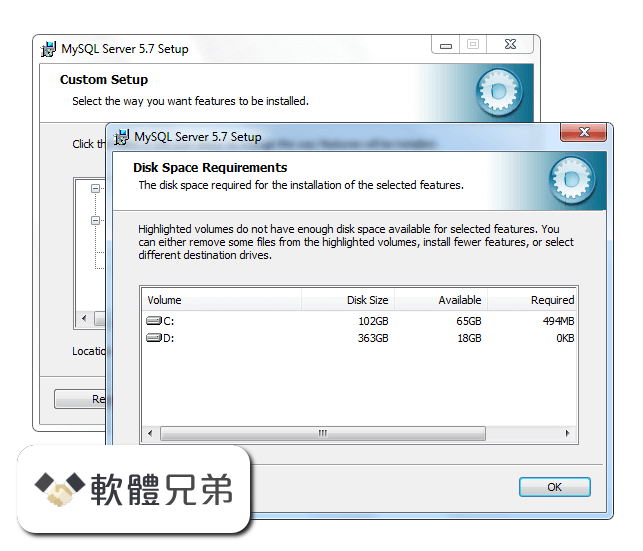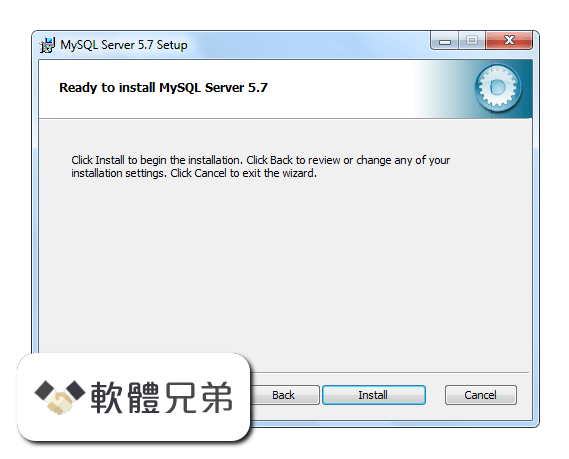|
What's new in this version: Functionality Added or Changed:
- Replication: View change events from a Group Replication group can now be replicated to an external multithreaded slave (MTS) of type DATABASE
- Replication: When a negative or fractional timeout parameter was supplied to WAIT_UNTIL_SQL_THREAD_AFTER_GTIDS(), the server behaved in unexpected ways
- If MySQL was configured to build with the -Wno-error option, mysql_config produced incorrect output for its --cflags option. The set of compiler options that mysql_config and pkg-config produce now is determined by whitelisting rather than
- The performance of UTF-8 binary collations was improved
- Consistency and maintainability of Debian/Ubuntu packaging maintainer scripts was improved
- mysql_secure_installation is more strict about what it considers valid yes and no responses
- The replace utility is deprecated and will be removed in MySQL 8.0. If you wish to continue using this utility, be sure to retain a copy from an installed version of MySQL
Bugs Fixed:
- InnoDB: The restriction that required the first undo tablespace to use space ID 1 was removed. The first undo tablespace may now be assigned a space ID other than 1. Space ID values for undo tablespaces are still assigned in a consecutive sequence
- InnoDB: A DROP TABLE operation raised an assertion on a server with an innodb_force_recovery setting of 5 or 6. DROP TABLE is no longer permitted with these innodb_force_recovery settings
- InnoDB: Compiling the server without the Performance Schema caused a build failure
- InnoDB: During read-ahead, the wrong page size was used to calculate the tablespace size
- InnoDB: Compiling on Fedora 25 using DWITH_LZ4=system resulted in a build failure due to a deprecated LZ4_COMPRESS_LIMITEDOUTPUT function
- InnoDB: Disabling macros such as UNIV_PFS_MUTEX, UNIV_PFS_RWLOCK, and UNIV_PFS_THREAD caused compilation errors
- InnoDB: A NULL virtual column field name in a virtual index caused a server exit during a field name comparison that occurs while populating virtual columns affected by a foreign key constraint
- InnoDB: The file handle type name for InnoDB file I/O Performance Schema instrumentation was changed from os_pfs_file_t to pfs_os_file_t
- InnoDB: During a range comparison, a secondary index field number was passed instead of clustered index field number, eventually causing the retrieval of an incorrect field
- InnoDB: A server exit on restart was caused by missing my_thread_init() and my_thread_exit() functions for background threads that initialize the st_my_thread_var structure
- InnoDB: A memcached read operation with a non-default read batch size configuration resulted in a server exit
- InnoDB: A gap lock was taken unnecessarily during foreign key validation while using the READ COMMITTED isolation level
- InnoDB: After a TRUNCATE TABLE operation on a table with a FULLTEXT index, space size was incorrectly calculated resulting in an invalid read
- InnoDB: During a checkpoint, all MLOG_FILE_NAME redo log records were written in a single mini-transaction (mtr), causing a log parsing buffer overflow
- InnoDB: A mechanism was added to debug builds to ensure that keys for InnoDB Performance Schema instrumentation are registered with Performance Schema. The mechanism causes startup to fail on debug builds if the number of Performance Schema keys does not match the number of registered Performance Schema keys
- InnoDB: A race condition while updating table statistics could result in an estimated row count of 1 and an incorrect query execution plan
- InnoDB: An error in code related to table statistics raised an assertion in the dict0stats.cc source file
- InnoDB: A concurrent DML operation during an in in-place ALTER TABLE operation that rebuilt the table did not update a virtual index, resulting in a mismatch between the virtual index and clustered index
- InnoDB: A TRUNCATE TABLE operation held the dict_sys mutex while scanning for and removing pages from the buffer pool, causing concurrent DDL operations to stall. The mutex is now released during the scan and acquired again when the scan is completed
- InnoDB: SELECT COUNT(*) performance regressed in some cases due to a modification introduced in MySQL 5.7.2 that caused InnoDB to count rows by traversing the clustered index instead of a smaller secondary index. The modification was reverted
- InnoDB: Inserting GIS data into an r-tree raised an assertion due to a missing page number field that was encountered when storing the b-tree cursor
- InnoDB: Performance Schema instrumentation for InnoDB file I/O was disabled on Windows
- InnoDB: The row_search_mvcc() function unnecessarily traversed the entire table for a range query, which occurred when the record was not in the transaction read view
- Partitioning: Updating a row of a table that had partitioning on a generated column could raise an assertion failure for debug builds, and return incorrect results in nondebug builds
- Replication: MEMBER_STATE of a group replication member did not go from ERROR to OFFLINE when the STOP GROUP_REPLICATION command was executed if the error state was due to ER3092
- Replication: With flow control enabled, reaching a minimum flow control quota of 1 will made Group Replication not stop throttling when the cause of throttling was no longer in effect
- Replication: Using an unresolvable host name in group_replication_group_seeds caused START GROUP_REPLICATION to fail. The fix ensures that host names in group_replication_group_seeds are validated when starting Group Replication and the list must contain at least one valid address. Invalid addresses are ignored
- Replication: The _gr_user account created by Group Replication plugin installation was not reliably removed when the plugin was uninstalled
- Replication: When starting Group Replication on an offline node, the node could be configured for replication, but fail for recovery
- Replication: When using a multi-threaded slave, applier errors displayed worker ID data that was inconsistent with data externalized in Performance Schema replication tables
- Replication: Not all Group Replication GCS debug and trace messages were enabled in debug mode
- Replication: Compiling MySQL 5.7.17 failed with a variable length array error
- Replication: In row-based replication, a message that incorrectly displayed field lengths was returned when replicating from a table with a utf8mb3 column to a table of the same definition where the column was defined with a utf8mb4 character set
- Replication: Group Replication GCS was not discarding messages when a member within the group was inactive
- Replication: Some unnecessary warnings were given when the Group Replication plugin was compiled on Windows platforms
- Replication: As assertion could be raised if the Group Replication plugin attempted to contact the server when that was no longer possible
- Replication: The GTID transaction skipping mechanism that silently skips a GTID transaction that was previously executed did not work properly for XA transactions
- Replication: After executing restarts on the group replication applier SQL thread, the plugin could no longer detect failure of the thread
- Replication: When the MTS slave applier stopped because of an (injected) error, it reported no useful information for troubleshooting
- Replication: FLUSH BINARY LOG could become slow with data replicated from many servers
- Replication: A partially failed CREATE USER, RENAME USER, or ALTER USER statement was not correctly consuming an auto-generated or specified GTID when binary logging was disabled
- Replication: Binlog_sender, which writes events from the binary log to a packet buffer and then sends the packet to the slave, did not reduce the size of the send buffer as expected
- Replication: When using a multi-threaded slave (slave_parallel_workers greater than 0) the value of Seconds_Behind_Master was incorrect when rotating a relay log
- Replication: The server prevented several replication-related administrative statements from working if the read_only system variable was enabled
- Replication: CHANGE MASTER TO for a channel that did not exist could raise an assertion
- Replication: The delay specified by the binlog_group_commit_sync_delay system variable was applied to too many binary log commit groups
- JSON: MySQL JSON source code built using with clang 3.9 raised undesired warnings
- mysqldump failed to properly quote certain identifiers in SQL statements written to the dump output
- Client preauthorization by the server was missing a length check for a length-encoded string
- The (undocumented) WINDOWS_RUNTIME_MD CMake option has been removed
- mysqld_safe failed to restart the server if a PID_FILE.shutdown file was present
- For Debian/Ubuntu packages, user-defined collation files could be overwritten during MySQL upgrades. Charset files are now marked as conffiles so that user customizations generate a prompt during upgrades whether to overwrite them
- For CREATE TABLE statements that specified the table name with a database qualifier and included a DATA DIRECTORY or INDEX DIRECTORY option, an error occurred if there was no default database
- Starting the server with performance_schema_digests_size=1 caused an abnormal exit
- MySQL failed to compile on some platforms with -DWITH_LIBWRAP=ON. CMake support now checks whether tcpd.h has proper function prototypes
- mysqld_safe did not check whether the directory named by the --basedir option existed
- Configuring CMake with -G ninja resulted in build output that was inappropriate for build platforms other than Xcode or Visual Studio
- mysqld_safe failed if the error log file named by the --log-error option was a FIFO
- For prepared statements, an alias within a subquery or derived table might cause incorrect behavior during statement execution if another alias depended on it
- mysqld_safe could fail if the --datadir option value ended with a / character
- A recent change to mysqld_safe caused the mysql.server script to be unable to start it if the base directory was specified as an absolute path that differed from the compiled-in default absolute path
- The connection_control plugin failed to compile if the Performance Schema was disabled
- Passwords did not expire correctly for accounts created using MySQL Workbench
- For System V init scripts for RPMs, the [mysqld] option-file section was being ignored for some options, such as pid-file
- Init scripts failed to launch mysqld_safe if a non-default base directory was used
- CMake now detects whether a GCC 5.3.0 loop optimization bug occurs and attempts a workaround if so
- mysqld_safe --no-defaults did not work (inadvertent consequence of an earlier bug fix)
- Semicolon (;) characters within or between statements could cause distinct digests to be generated from identical statements
- For a client linked against libmysqlclient, invalid memory access could occur during use of prepared statements
- The fix for Bug #25088048 caused the command used by mysqld_safe to start the MySQL server to no longer include the mysqld path
- Executing a stored procedure containing a query that accessed a view could allocate memory that was not freed until the session ended
- Compilation on FreeBSD 11 failed attempting to check MAP_NORESERVE, which is no longer defined
- CMake support was added for compiling using the -std=c++03 option under Developer Studio 12.5. This is now used rather than stlport by default
- Privilege checking could be incorrect for a derived table used within a multiple-table UPDATE invoked within a stored procedure or view object, for the second or subsequent execution of the object, if the derived table was merged into the outer query
- Connections from a client to a server with SSL enabled succeeded even if --ssl-mode had a value of VERIFY_CA or VERIFY_IDENTITY and the client did not provide a CA certificate
- If InnoDB statistics were incorrect, FOUND_ROWS() could return 1 even when the previous SELECT returned no rows
- CMake now sets -DWITH_NUMA=ON for Debian platforms where possible
- A query could produce incorrect results if the WHERE clause contained a dependent subquery, the table had a secondary index on the columns in the select list followed by the columns in the subquery, and GROUP BY or DISTINCT permitted the query to use a Loose Index Scan
- The DebugPrintTest and DebugPrintDeathTest unit tests did not handle divide-by-zero testing properly on the Aarch64 platform. Thanks to Alexey Kopytov for the patch
- Some account-management statements could incorrectly set the account password_lifetime value to NULL
- Changes made to mysqld_safe in recent MySQL releases require the --ledir, --mysqld, --mysqld-version options to be specified on the command line; they can no longer be specified in option files. This could cause failure of init scripts that invoke mysqld_safe. Such scripts now pass the value of the MYSQLD_OPTS environment variable as the first command-line argument to mysqld_safe, with the value set to such command line-only mysqld_safe option values as may be required. On platforms that use /etc/sysconfig/mysqld, the MYSQLD_OPTS value can be set in that file with a line such as this: MYSQLD_OPTS=" --ledir=/mysqld_ledir --mysqld=my_wrapper "
- The value of MYSQLD_OPTS can also include mysqld options for mysqld_safe to pass to mysqld
- For LOAD DATA used to insert data into an updateable view, the check to verify whether a column is actually updatable was missing
- Queries of the form SELECT NULL IN (subquery) could raise an assertion due to a missing null-pointer check
- When populating the variables_by_thread table, the Performance Schema could attempt to access session variables of other threads that were being deinitialized
- On Debian/Ubuntu platforms, the systemd startup script for MySQL ignored datadir settings in /etc/mysql/my.cnf
- For the null_audit plugin, setting the null_audit_event_record system variable improperly could cause a server exit. This variable should be set only from within the null_audit plugin, so it is now read only
- A regular expression pattern match into a large string could result in a server exit due to memory allocation failure or integer overflow
- An incorrect error was reported for CREATE TABLE statements with a large value for the CONNECTION table option. The value is now limited to 1024 bytes
- For debug builds, if the binary log was enabled, executing the audit_log plugin audit_log_filter_set_filter function could cause a server exit
- MySQL Enterprise Firewall did not record events if the audit_log plugin was installed
- EXPLAIN SELECT COUNT(*) FROM tbl_name could incorrectly report an Extra value of Select tables optimized away due to a modification introduced in MySQL 5.7.2 that caused InnoDB to count rows by traversing the clustered index instead of a smaller secondary index. The Extra value now displays Count Rows
- mysqldumpslow failed to parse timestamps in the slow query log; it had not been updated to track a change in log timestamp format
- Complete logical backups made with mysqlpump could not be restored if GTIDs were enabled
- Messages written by the audit_log plugin to the error log regarding MYSQL_AUDIT_CONNECT event failures now print the underlying error cause as well to aid debugging
- FORCE INDEX was ineffective for SELECT COUNT(*) queries
- The audit_log plugin audit_log_filter_remove_filter() function caused a server exit if given a NULL argument
- Grant tables with incorrect structure may cause problems in user management operations. As a consequence of the fix for this, for any operation that modifies a grant table, the server now checks whether the table has the expected structure and produces an error if not. mysql_upgrade must be run to update the tables to the expected structure
- Improper handling of a lock used by the version_tokens plugin and user-defined functions could result in a server exit if a UDF was called while version_tokens was being uninstalled
- The QUOTE() function could allocate excessive memory. A limit of max_allowed_packet bytes is now imposed and returns NULL with a warning for attempts to allocate more
- When attempting to locate the data directory, mysqld_safe incorrectly considered $MY_BASEDIR_VERSION/var as one of the possible locations
- The main.log_tables-big test case could be unstable on highly loaded hosts. Thanks to Laurynas Biveinis for the patch
- The rpl.rpl_key_rotation test case did not synchronize properly with the master server. Thanks to Laurynas Biveinis for the patch
- Queries that used an aggregate function with DISTINCT could produce incorrect results
- For RPM packages, the default error-log location in the deployed /etc/my.cnf file differed from the location in the installed logrotate script, causing logrotate to fail
- After performing inserts in a table containing an AUTO_INCREMENT column and then performing a SELECT operation, the LAST_INSERT_ID() returns the correct value, but the value of the mysql_insert_id() C API function was being reset to 0
- With the use_index_extensions flag of the optimizer_switch system variable disabled, some SELECT DISTINCT queries could return incorrect results
- Debian packages were missing an AppArmor-related include file and incorrectly were marked dependent on AppArmor (making it impossible to disable AppArmor by uninstalling it)
- In a replication environment, SET PASSWORD or ALTER USER could fail to execute on the slave due to failure to parse the hash string correctly
- On non-Linux Unix systems, the mysql.server startup script used the Linux command pidof rather than pgrep
- Starting multiple instances of mysqld_safe after an abnormal server exit could result in one mysqld_safe instance killing another. As a consequence of the bug fix, the mysqld_safe.pid file is no longer used
- The --help message for mysqld_safe was corrected to mention that the --no-defaults, --defaults-file, and --defaults-extra-file options, if given, must be the first argument
- The bounds check for the XML parser position stack for each level (which has a fixed depth) used the size of the array as the upper limit, and so was off by one. This is fixed by decreasing the allowable depth by one, which actually matches the maximum number of elements in the position stack. Timestamps for server-side prepared statements could be written to the binary log up to a second behind timestamps for the corresponding nonprepared statements, leading to time value differences between master and slave servers
MySQL 5.7.19 (32-bit) 相關參考資料
Download MySQL Community Server
MySQL Community Server 8.4.0 LTS ; Linux - Generic (glibc 2.28) (x86, 64-bit), Compressed TAR Archive Test Suite, 8.4.0, 339.7M ; (mysql-test-8.4.0-linux-glibc2.
https://dev.mysql.com
Download MySQL Community Server (Archived Versions)
8.0.32, 8.0.31, 8.0.30, 8.0.28, 8.0.27, 8.0 ... 5.7.19, 5.7.18, 5.7.17, 5.7.16, 5.7.15, 5.7.14, 5.7.13 ... Linux - Generic (glibc 2.28) (x86, 64-bit), Compressed ...
https://downloads.mysql.com
Download MySQL Installer
Windows (x86, 32-bit), MSI Installer, 5.7.44, 373.7M. Download. (mysql ... Note: MySQL Installer is 32 bit, but will install both 32 bit and 64 bit binaries.
https://dev.mysql.com
Download MySQL Installer (Archived Versions)
To download the latest release of MySQL Installer, please visit MySQL Downloads. Product Version: 8.0.36, 8.0.35, 8.0.34, 8.0.33, 8.0.32 ... 5.7.19, 5.7.18, 5.7.
https://downloads.mysql.com
Downloading MySQL 5.7.19 (32-bit) from FileHorse.com
The world`s most popular open-source relational database management system · MySQL 5.7.19 (32-bit) · Key details about this download.
https://www.filehorse.com
MySQL 32 bit Server will not install for use with hMailServer
2018年12月11日 — 13. Even when you attempt to install MySQL version 5.7.24 or MySQL version 5.7.19 (the version I had been using), MySQL installer will still ...
https://www.hmailserver.com
MySQL 5.7 Release Notes
This document contains release notes for the changes in each release of MySQL 5.7, up through MySQL 5.7.44. For information about changes in a different MySQL ...
https://docs.oracle.com
MySQL 5.7.19 (32-bit) Download
2017年7月18日 — Download MySQL 5.7.19 (32-bit) for Windows PC from FileHorse. 100% Safe and Secure ✓ Free Download 64-bit Software Version.
https://www.filehorse.com
MySQL 5.7.19 not installing. Giving same error
2017年7月24日 — This happened to me as well today actually. What you need to do is to install the Visual C++ Redistributable Packages for Visual Studio 2013 ...
https://stackoverflow.com
MySQL Installation MySQL Server Failed 5.7.19
2017年8月1日 — i have solved the same problem...it arises because we have installed 64 bit Visual Studio 2013 Redistributable but the installer is 32 bit ...
https://stackoverflow.com
|
